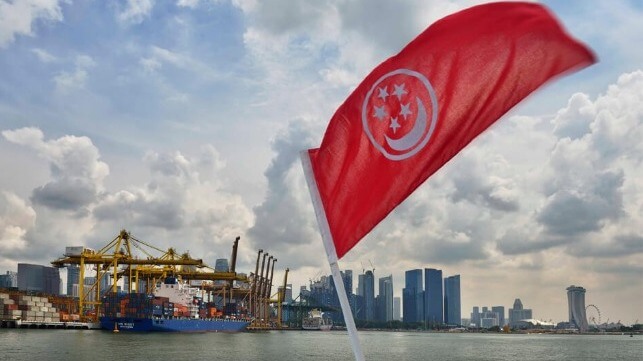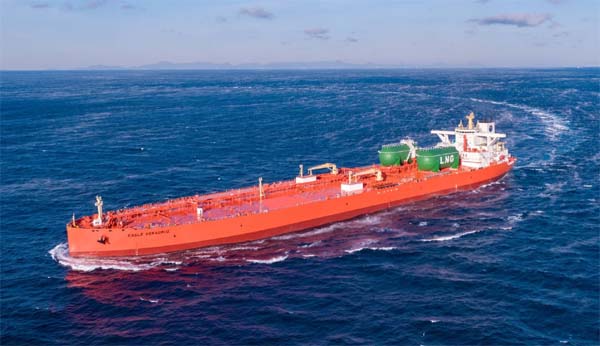Singapore Registry Passes 100M GT as Maritime Operations Grow

Singapore marked a key milestone for its ship registry reporting that it has for the first time surpassed the 100 million gross registered tonnage mark with the naming today of a new VLCC tanker. It comes as the city-state works to maintain its role at the forefront of the maritime industry and a leader in bunkering and new technologies.
The city was the backdrop for the naming ceremony for the VLCC Eagle Verzcruz, a newly built crude oil tanker owned by AET Tankers, a member of the MISC Group and one of the largest owner-operators of tankers and specialized vessels. Built at Hanwha Ocean in South Korea, the vessel is 300,000 dwt and the third and final vessel in a 2021 agreement which will see Shell Tankers (Singapore) operate the vessel under a long-term charter.
With the official entry of the vessel into the Singapore Registry of Ships, the flag society surpassed the 100 GT mark. Founded in 1966, the Flag Society administers the Singapore flag with about 4,000 vessels. They highlight their role in ensuring that vessels comply with International Maritime Organization conventions to ensure safety, efficiency, and environmental protection.
The flag ended 2023 with a four increase in tonnage to a total of 99.56 million GT up from 95.47 million GT at the end of 2022. Among the programs the flag seeks to highlight is its Green Ship Certificates, which ships receive for efforts including the use of low-carbon fuels such as methanol as well as employing energy-efficient technologies that enable ships to exceed the Energy Efficient Design Index (EEDI) requirements managed by the IMO. Currently, 22 Singapore-flagged ships from 10 companies have received the Green Ship Certificates.

Eagle Veracruz was named today in Singapore officially increasing the registry above the 100 million gross ton mark (AET Tankers)
Fittingly to highlight the focus on energy efficiency and improved emissions, the new Eagle Veracruz is a dual-fuel LNG VLCC. The vessel’s design incorporates an optimized hull form and propellers, wake improvements ducts, and a rudder bulb to improve energy efficiency. The main engine was also built using a modular concept to allow for future retrofit options to potentially run on low- and zero-carbon fuels.
The milestone for the registry comes as the Port of Singapore also reported significant growth in 2023. Annual vessel arrivals by tonnage crossed the three billion GT market for the first time last year. It was up more than nine percent to just under 3.1 billion GT. The growth in vessels also helped Singapore to reach a new record for bunker sales and to maintain its role as the world’s largest bunker port. A total of 81.8 million tones of bunker sales was recorded in 2023 beating the previous record of 50.64 million tons in 2017.

that matters most
Get the latest maritime news delivered to your inbox daily.
Singapore also continues to be a regional hub and transshipment port of Southeast Asia. A total of 591.7 million tons of cargo was handled at the port in 2023, including a record 39 million TEU. Port officials highlight that eight berths are now operating at the new Tuas Port while they reached 70 percent for the land reclamation project in phase two of the container terminal development.
Singapore looks to increase its efforts in new technologies and alternative fuels. Last year, the Laura Maersk bunkered with methanol marking a first for the port and they look to expand methanol operations. Studies are also underway on ammonia and other alternative to maintain Singapore as the leading bunkering port and hub in Southeast Asia.
